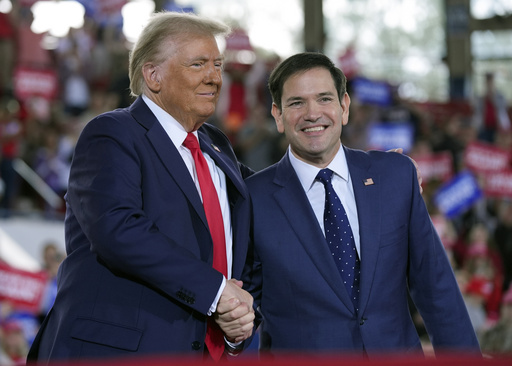TALLAHASSEE, Florida — President-elect Donald Trump has officially selected Senator Marco Rubio to fill the position of Secretary of State.
Here are five key points to note about the Florida Republican, who is currently serving his third term in the U.S. Senate:
Senator Rubio was born in Miami to Cuban immigrant parents. At the age of 53, he has consistently emphasized his working-class roots throughout his political career. His father worked as a bartender while his mother was employed as a hotel maid. In his initial campaign for the Senate, he frequently shared the narrative of his upbringing as a testament to the American Dream, illustrating how he overcame challenges to eventually become a U.S. senator.
Though he identifies as Catholic, Rubio spent part of his childhood in Las Vegas, where he was baptized in the Church of Jesus Christ of Latter-Day Saints and attended services associated with the Mormon faith. His family relocated to Las Vegas when he was eight, seeking employment in the flourishing hotel sector. By the time he was 14, they moved back to Miami.
Rubio also has a noteworthy background in sports and personal life. He was an avid football player in high school, aspiring to enter the NFL. Despite receiving some interest, he opted to attend Tarkio College in a small Missouri town that had fewer than 2,000 residents. After sustaining an injury and facing the reality of the college’s financial struggles, he decided to shift his focus and transferred to a school in Florida. Rubio earned degrees from both the University of Florida and the University of Miami Law School. In 1998, he married Jeanette Dousdebes, a former Miami Dolphins cheerleader, and the couple has four children together.
Before his tenure in the Senate, Rubio was on the verge of assuming the role of Florida’s attorney general. He served in the Florida House of Representatives and held the positions of majority leader and speaker. In 2010, he ran against then-Governor Charlie Crist for the GOP Senate nomination. Initially urged by party leaders to abandon his Senate bid and vie for attorney general instead, Rubio felt torn. However, following a confrontation with a reporter regarding rumors of his switching races, he decided to remain in the Senate race, ultimately securing victory and earning reelection in subsequent terms in 2016 and 2022.
In 2016, Rubio entered the presidential race and found himself in competition with a large Republican field that included Trump. He achieved victories in Minnesota, Washington, D.C., and Puerto Rico, although he ultimately exited the race after Trump won Florida decisively. The two exchanged barbs during the campaign, with Trump nicknaming Rubio “Little Marco.” In response, Rubio mocked Trump’s stature, referring to him as a “con artist.” Following the campaign, their dynamic notably improved, especially during Trump’s presidency, with Rubio downplaying their past exchanges as merely part of the electoral process.
Rubio has remained a vocal advocate for addressing foreign threats, particularly from China. Rising to prominence during the Tea Party movement in 2010, he has since become a key figure in national discourse regarding foreign policy. As the vice chairman of the Senate Select Committee on Intelligence and a member of the Foreign Relations Committee, he frequently highlights concerns about military and economic challenges posed by China, Iran, North Korea, and Russia. He warns that these nations are uniting in their efforts to undermine the United States and its global alliances. In a speech delivered last March, he stated, “They all share one goal, which is to weaken America, compromise our alliances, and diminish our standing and capabilities.”


